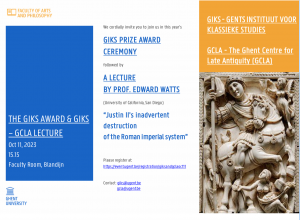Upcoming events
- Sofía Torallas Tovar (University of Princeton), “When Materiality Matters: Codicology and Paleography Reveal the Work of the Scribe“.
Lecture to be given in Thursday 10th October at 14h in the Faculty Board Meeting Room (Blandijn, first floor). - Symposium on Ancient Narrative and its Reception: a Tribute to Prof. Saiichiro Nakatani (1972-2023).
To be held on March 14, 2025 at the Faculty Board Meeting Room (Blandijn, first floor). Full programme - Course Syriac Language and Literature – Basic course for the academic year 2024-2025.
Syriac is a Semitic language that originated as the local dialect of the city of Edessa (modern Şanlıurfa, in southeast Turkey) between the second and the third century AD. From this local starting point, it became the literary and liturgical language of several churches in the East, and it maintains this role until now. The goal of the course is to offer a comprehensive introduction to both Syriac language and culture. The focus will be on mastering the basic grammar and developing the skills to read and translate easy texts, as well as on getting familiar with the main Syriac authors and literary genres. All necessary tools, such as grammars, exercise books, and compendia, will be provided to the participants at the beginning of the course.The course will consist of a weekly 2-hours class, starting from October. The day and time of the classes will be chosen together with the participants before the start of the course. The classes will be divided into a first, longer part dedicated to the grammar, and a second one dedicated to the presentation of an author or a work, according to the attached syllabus. The course will be taught in English by Carlo Emilio Biuzzi (PhD, Department of History) and Giorgia Nicosia (PhD, Department of History), in collaboration with Giovanni Gomiero (PhD, Department of History). It will be held in hybrid form, so it can be attended either in Ghent or online, via Teams.
Public lectures
- Mathijs Clement (University of Cambridge), ‘‘Crafting a capital: Gregory of Nazianzus and the Second Rome’’. Paper presented on September 17, 2024, in the Camelot meeting room at the Blandijn at 12:30.
- Alex Corona Encinas (University of Valladolid), on the nexus of religion and the army under the emperor Constantine. Research seminar presented on May 17, 2024, at the Blandijnberg at 11:30.
- Micaela Brembilla (Uppsala University), “Mustio and his Gynaecia – pontifex of Soranus or just a very lucky guy?”. Lecture given on April 18, 2024 in the Camelot room at the Blandijnberg at 13:00.
- Mariana Bodnaruk (Central European University), “Titulus loquens: The Speaking Inscriptions of the Senatorial Office-Holders in the Later Roman Empire”.
Lecture given on December 12, 2023, in the Faculteitszaal at the Blandijnberg at 12h. - Nicolò D’Alconzo (Ghent University): “Women of fiction. The heroines of the ancient Greek novels and their Byzantine readers” by Nicolò D’Alconzo.
Lecture given on November 22, 2023 for the 2023-2024 lecture series of the Griekenlandcentrum. - Prof. Edward Watts (UC San Diego): “Justin II’s inadvertent destruction of the Roman imperial system”
Lecture given on October 11, 2023.
- Prof. Eleni Bozia (University of Florida), “From Favorinus’ “Γαλάτης ὢν ἑλληνίζειν” to JFK’s “Ich bin ein Berliner”: In search of ideals of diversity and inclusion”.
Lecture given on March 15, 2023. - Mariapia Mucciogrosso (UCLouvain), “Building Blocks for the Editio Critica Maior of Gregory of Nazianzus’ Or. 19”.
Lecture given online on February 23, 2023, for the TeTra – Text and Transmission Joint Research Seminar - Yasmine Amory (Ghent University): “People of Aphrodite. Life and culture in a late antique Egyptian village”.
Lecture given on February 22, 2023, for the 2022-2023 lecture series of the Griekenlandcentrum (full programme). - Sadi Maréchal (Ghent University): “Sins can (not) be washed away. Baths and Bathings habits in late antique society”.
Lecture given on January 17, 2023, for the Verein für Spätantike Archäologie und Byzantinische Kunstgeschichte in the Museum für Abgüsse Klassischer Bildwerke in Munich. - Opening launch
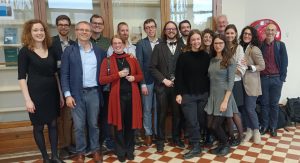 The Ghent Centre for Late Antiquity was officially launched on October 4th 2022.
The Ghent Centre for Late Antiquity was officially launched on October 4th 2022.
Lieve Van Hoof, the Centre’s first Director, emphasized the wish for closer interdisciplinary collaboration within Ghent University as well as the wish to strengthen international collaboration on Late Antiquity.
After a series of overviews and sample papers of late antique research currently being conducted at Ghent University, Peter Heather (King’s College London) gave a keynote lecture on “From Late Rome to Late Antiquity – and possibly beyond? ”.
full programme of the day
review
Conferences
- “Real and Imagined Boundaries in Late Antiquity (4th-9th c.)” (Ghent, April 28-30, 2025)
Organisers: Carlo E. Biuzzi, Yannis Brichant, Angelo Gargiulo, Giovanni Gomiero, Karl Robinson, Ricarda Schier
programme & call for papers
- “Meet the Jury. Manuscripts studies: from material aspects to critical editions” (Ghent, September 13, 2024)
Organizer: Peter Van Nuffelen
- “‘Overwhelmed. Spectacles & Visuality in Early and Late Imperial Poetry’ (Ghent, December 7-8, 2023)
Organizers: Vicente Flores Militello, Marco Formisano, Aaron Pelttari.
The conference took place at Ghent University on December 7-8, 2023.
More information - “Multilingual literary practices in a multicultural world, from Archaic Greece to the Byzantine Empire” (Rome, November 14-15, 2023)
Organizers: Eleni Bozia, Klaas Bentein, Chiara Monaco
The conference took place in Rome on November 14-15, 2023.
More information
- “Roman Baths and Agency” (Rome, October 18-20, 2023)
Organizers: Sadi Maréchal, Konogan Beaufay and Maura Medri
The conference took place in Rome, Italy (Academia Belgica) and online on October 18-20, 2023.
More information - 14th Celtic Conference in Classics (Coimbra, 11-14 July 2023)
Three panels organised by several members of the GCLA will be held at the next CCC:
– “Apuleius’ Metamorphoses and the Greek Novel” (more information)
Organizers: Rachel Bird, Olivier Demerre, Ian Repath
– “Interfacing with linguistic norms, 323 BCE – 1453 CE” (more information)
Organizers: Chiara Monaco and Ugo Mondini
– “The unwritten side of (im)politeness. Investigating non-verbal communication in ancient sources” (more information)
Organizers: Yasmine Amory and Marco Catrambone - Lexicologie et lexicographie syriaque: 4-9 July, 2022
Together with Professor Riccardo Contini, Mara Nicosia was the organizer of the atelier “Lexicologie et lexicographie syriaque” at the 13th Symposium Syriacum (Paris, 4-9 July 2022).
- ICAN VI: 21-24 September 2022
The sixth International Conference on the Ancient Novel took place in Ghent 21-24 September 2022.
More information - LVLT14: 5-9 September 2022
The 14th International Colloquium on Late and Vulgar Latin (Latin vulgaire – latin tardif XIV) was held at the Faculty of Arts and Philosophy of Ghent University (Belgium) from Monday, September 5th to Friday, September 9th, 2022. It was organized by the Latin section and the research group DiaLing at the Department of Linguistics.
More information
Workshops
Letters and Politics in Late Antiquity: Autocracy, Bureaucracy, and Lobbying in the Later Roman Empire, 31 May – 2 June 2023
Organisers: Prof. Dr Lieve Van Hoof, Marijke Kooijman, Matthijs Zoeter
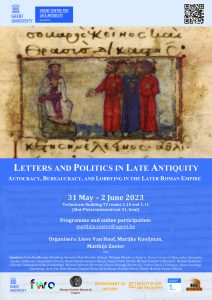 From May 31st to June 2nd, Ghent will be hosting an international workshop on the role of letters in late antique Roman politics (4th to 6th century AD): how did various late antique actors and interest groups use letters to try and influence decision making processes on all levels?
From May 31st to June 2nd, Ghent will be hosting an international workshop on the role of letters in late antique Roman politics (4th to 6th century AD): how did various late antique actors and interest groups use letters to try and influence decision making processes on all levels?
Letters played a prominent role in the functioning of the social and political life in the late Roman Empire. News and information were often communicated by letter, and imperial and ecclesiastical decisions were in many cases negotiated and communicated via letters, which could even carry the force of law. As a result, letters are an invaluable source for research on late antique politics, yielding insight not just into decisions, but also into decision making processes. From this point of view, letters disclose the functioning of late Roman politics as a dynamic practice of negotiation and diplomacy. The thousands of letters that have been preserved from these centuries show late antique correspondents using the genre of the letter for recommending, arguing, defining, ordering, requesting, debating, and lobbying, in an attempt to influence decision making processes to their own advantage, as well as for authoritatively communicating decisions and laws.
The aim of this workshop is to shed new light on the important but underinvestigated role of letters in late antique Roman politics: what was the role of letters in late antique elite networks, the imperial bureaucracy and ecclesiastical controversies? What were the functions of different letter types, including letters of recommendation, petitions to the Emperor and the imperial legislative letters? How was authority created through letters in the context of legal procedures and theological controversy? What was the role of letter collections in this political use of letters?
This workshop has been generously funded by the Ghent University Special Research Fund (BOF), the Research Foundation – Flanders (FWO), the Roman Society Research Centre (RSRC), the Department of History of Ghent University, the Faculty Research Fund of the Faculty of Arts and Philosophy of Ghent University, the Henri Pirenne Institute for Medieval Studies (HPIMS), and the National Research School in Classical Studies in the Netherlands (OIKOS).
The Reuse of Ancient and Late Antique Narratives in the Medieval Middle East and Beyond: 31 January 2023
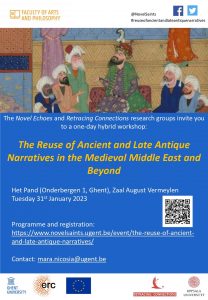
Organizers: Mara Nicosia, Koen De Temmerman, Ingela Nilsson.
The workshop focuses on the reception of ancient and late antique narratives across languages and cultures in the Middle Ages and brings together participants from Latin, Greek, Middle Eastern, Iranian, and Georgian studies.
Ancient Concepts of Fiction and Narrative in the Imperial Period and Late Antiquity: 18 November 2022
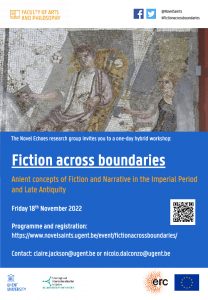
Organizers: Anne Alwis, Nicolò D’Alconzo, Koen De Temmerman, Claire Jackson, and Ruth Webb.
This is the fourth and final meeting of a series of workshops co-organised by the universities of Ghent, Kent, and Lille organized with the aim of generating new insights on the distinctions between true, false, and plausible narratives in the Mediterranean region 100-700 CE, a period of transition from pluralist polytheism to a Christian Empire and from Antiquity to the Middle Ages. This period saw a flourishing of different kinds of narratives with differing claims to truth. How do such attitudes to truth, fiction and lies and their interrelationship alter during this period and how is this manifest in the written narratives?
Following the previous meetings in Ghent (4th February), Kent (25th February) and Lille (13th May), this meeting aims to continue thediscussions developed throughout the year about different manifestations of fiction across the imperial period into Late Antiquity and beyond, with the particular goal of breaking down boundaries between Christian and pagan approaches to fiction. By allowing for a diversity of voices and a breadth of approaches to this topic, these workshops aim to develop a more nuanced and a more generous conception of fiction in postclassical antiquity and to point towards new directions for future research on this theme.
Book launches
- Book launch of Oudheidkunde is een wetenschap by the science journalist Jona Lendering in book store De Groene Waterman in Antwerp on November 29, 2023.
- Book launch of Late Roman Italy. Imperium to Regnum edited by Jeroen Wijnendaele.
In collaboration, with the RomanIslam centre (Universität Hamburg) a round table will be organised on November 21, 2023. - Launch of the series “sera tela: Studies in Late Antique Literature and Its Reception” and of the book Epitomic Writing in Late Antiquity and Beyond. Forms of Unabridged Writing (eds. Paolo F. Sacchi and Marco Formisano, Bloomsbury 2022) on March 8, 2023, at 18:30, at the Vandenhove-paviljoen (Ghent University).
The session will be chaired by Julie van Pelt and will include an online discussion with Ralph Hexter (UC Davis), Christiane Reitz (Rostock), Allison Sharrock (Manchester) and Carlos Spoerhase (Munich)
Intensive and summer courses
CRASH COURSE IN GREEK PALEOGRAPHY: Leiden University Library, 27-28 May 2024.
The Leiden University Centre for the Arts in Society, Leiden University Library and the Greek department of Ghent University offer a two-day course in Greek palaeography in collaboration with the Research School OIKOS. The course is intended for MA, ResMA and doctoral students in the areas of Classics, Ancient History, Ancient Civilizations and Medieval studies with a good command of Greek. It offers a chronological introduction into Greek palaeography from the Hellenistic period until the end of the Middle Ages and is specifically aimed at acquiring practical skills for research involving literary and documentary papyri and/or manuscripts. This course gives the unique opportunity to practice reading on original papyri and manuscripts from the collection of the Leiden Papyrological Institute and the special collections of the Leiden University Library.
Introduction to Syriac (2023/2024)
The Junior Researchers of the GCLA are glad to offer the course Introduction to Syriac for the academic year 2023-2024.
The goal of the course is to offer a comprehensive introduction to both its language and its culture and history. The focus of the course will be on mastering the grammar and developing the skills to read the different scripts and to translate easy texts. All necessary tools, such as grammars, exercise book, and dictionaries, will be provided to the participants at the beginning of the course.
The course will consist of a 2-hours class once a week, starting from late-October, with a possible second weekly appointment to practise together the material learnt during the classes. The syllabus and the schedule will be tailored to accommodate the preferences of the participants at the beginning of the course. The course will be taught by Giovanni Gomiero (PhD, Department of History) in collaboration with Giorgia Nicosia (PhD, Department of History).
Crash Course in Greek Palaeography: 22-23 May, 2023
The Greek department of Ghent University offers a two-day course in Greek palaeography in collaboration with the Research School OIKOS. The course is intended for MA, ResMA and doctoral students in the areas of Classics, Ancient History, Ancient Civilizations and Medieval studies with a good command of Greek. It offers a chronological introduction into Greek palaeography from the Hellenistic period until the end of the Middle Ages and is specifically aimed at acquiring practical skills for research involving literary and documentary papyri and/or manuscripts. We will also provide the unique opportunity to read from original papyri in the papyrus collection of the Ghent University Library and become familiar with the ongoing research projects at Ghent University.
Introduction to Classical Arabic: 15-26 August, 2022
This summer Ghent University and OIKOS organized the second summer course introducing Classical Arabic. This year we offered an extended two-week course to allow more in-depth practice with the Arabic script and orthography, besides the treatment of basic grammatical concepts and the reading of course material. The program consisted of a theoretical morning block, where we introduced the script and grammar. In the afternoon one could choose to focus either on documentary or literary material. In the afternoon sessions we read relevant texts to give you hands-on experience with the text type of your choice.
Instructors: Simon Ford (literary texts); Fokelien Kootstra (papyri).
